Crescent Sustainability Initiatives
CLEAN WATER AND SANITATION (SDG 6)
The seminar titled “Sustainable Management of Clean Water and Sanitation in Rural and Urban Areas” took place on February 15, 2023, at B.S. Abdur Rahman Crescent Institute of Science and Technology. Organized by the Institution of Engineers (India) Kanchepuram Local Centre in collaboration with the Department of Civil Engineering, this event aimed to tackle the pressing water management and sanitation challenges faced by communities.
The seminar featured Dr. D. Elango, a distinguished figure and National Council Member of the Institution of Engineers (India), as the chief guest. He was joined by other notable speakers, including Dr. G. Suryanarayana, and Dr. M.S. Haji Sheik Mohammed, who provided valuable insights on the topic. Dr. Vasanthi Padmanabhan coordinated the event, ensuring seamless communication and engagement among participants.
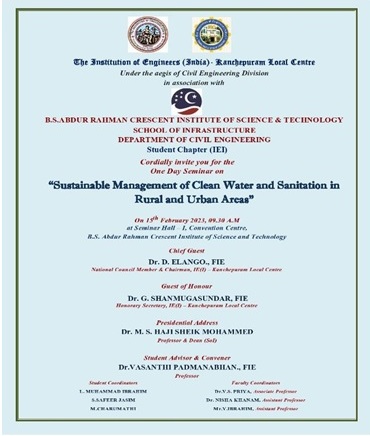
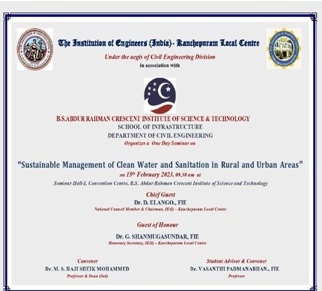
Figure VI (5.6) – 1: One Day Seminar on Sustainable Management of Clean Water & Sanitation in Rural and Urban Areas
1. INTRODUCTION TO THE SEMINAR ON WATER MANAGEMENT
On February 15, 2023, a significant seminar titled “Sustainable Management of Clean Water & Sanitation in Rural and Urban Areas” was organized by the Institution of Engineers (India) and the Department of Civil Engineering, School of Infrastructure at B.S. Abdur Rahman Crescent Institute of Science & Technology. The event opened with a warm welcome from Dr. Vasanthi Padmanabhan, Professor & Student Advisor at the School of Infrastructure, who introduced the chief guest, Dr. D. Elango, FIE, National Council Member and Chairman of IE(I)-Kanchepuram Local Centre. The seminar aimed to address critical issues surrounding water and sanitation management in both urban and rural contexts.
2. KEYNOTE ADDRESS AND INSIGHTS
Dr. D. Elango inaugurated the seminar and delivered the keynote address, emphasizing the importance of advocacy and membership in the Institution of Engineers (India). He highlighted the growing opportunities within the field of civil engineering and encouraged students to engage in project proposals that seek funding for innovative solutions. His emphasis on collective efforts in addressing sanitation and clean water challenges resonated with participants, motivating them to contribute actively to this crucial sector.
3. ADDRESSING WATER AND SANITATION ISSUES
The seminar shed light on the alarming statistics regarding water access in India: approximately 40% of households lack a public piped water supply, and only a fraction of wastewater is treated. These statistics underscore the pressing need to address both spatial and resource distribution challenges associated with water and sanitation. Dr. M. S. Haji Sheik Mohammed, Dean of the School of Infrastructure, further reinforced the notion that both water access and sanitation are not only environmental concerns but also fundamental human rights, necessitating immediate action.
4. CHALLENGES IN WATER MANAGEMENT
During the discussions, several key challenges in the field of water management emerged. Participants identified inadequate awareness about sanitation practices, a lack of an integrated approach, and limited technological options as significant hurdles. The seminar emphasized the need for more education and training to enhance knowledge and skill levels in water management’s technical and managerial aspects. These challenges highlight the current inefficiencies and the critical gaps that need to be addressed.
CALL TO ACTION
The seminar served as a comprehensive program to introduce attendees to pressing issues and opportunities within the realm of water supply, management, and sanitation. By aggregating insights from various experts, it laid a foundation for future initiatives focused on sustainable water management. As participants left the seminar, they were encouraged to take action in their communities, fostering a culture of conscious water usage and advocating for integrated management strategies to help improve individuals’ lives in both urban and rural areas.
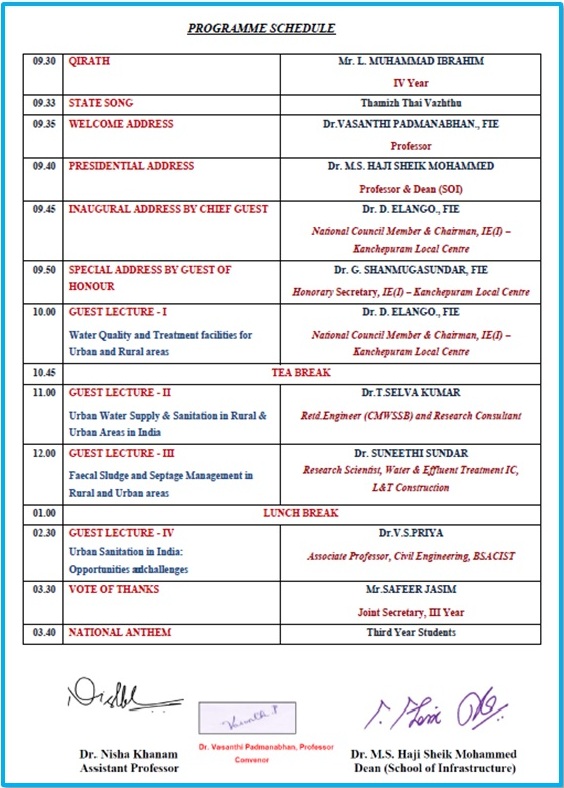
Figure VI (5.6) – 2: Programme Schedule
The program schedule for the seminar titled “Sustainable Management of Clean Water and Sanitation in Rural and Urban Areas” highlights a well-structured lineup aimed at addressing critical issues surrounding water management and sanitation. The event commenced at 9:30 AM with a Qirath recitation by Mr. L. Muhammad Ibrahim, setting an engaging tone for the day. This was followed by the State Song, a tradition that fosters a sense of unity and purpose among attendees.
Dr. Vasanthi Padmanabhan delivered the welcome address, warmly inviting participants and underscoring the significance of the seminar. Following her address, Dr. M.S. Haji Sheik Mohammed, the Dean, provided the presidential address, emphasizing the importance of the themes being discussed. The inaugural address was given by the chief guest, Dr. D. Elango, who serves as the National Council Member and Chairman of the Kanchepuram Local Centre. His insights set the foundation for the discussions to follow.
The schedule included a series of guest lectures focusing on various critical topics related to water management. The first lecture, presented by Dr. Elango, delved into water quality and treatment facilities for urban and rural areas. This was followed by lectures on urban water supply and sanitation, presented by Dr. T. Selva Kumar, and facul sludge and septic management by Dr. Suneet Sundar. After a lunch break, the final guest lecture covered urban sanitation challenges and opportunities, presented by Dr. V. S. Priya, an Associate Professor in Civil Engineering.
The day concluded with a vote of thanks delivered by Mr. Safeer Jasim, acknowledging the contributions of all speakers and participants. The seminar closed with a national anthem led by third-year students, encapsulating the event’s focus on fostering a spirit of unity and commitment to sustainable water management practices. The program schedule showcases a comprehensive effort to educate and engage local communities in vital water management issues.
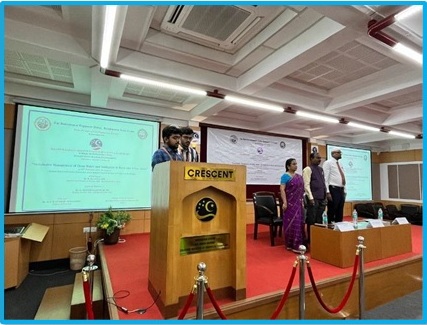
Figure VI (5.6) – 3: Thamizh Thai Vaazthu by Mr.Safeer Jasim, Join Secretary IE(I)
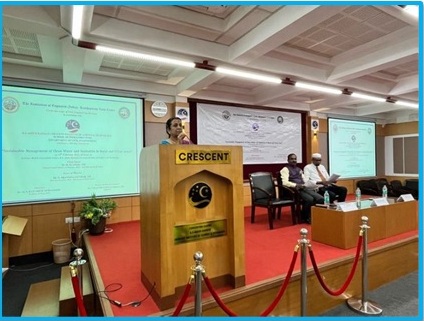
Figure VI (5.6) – 4: Welcome address by Dr.Vasanthi Padmanabhan, Professor & Student Advisor IE(I)
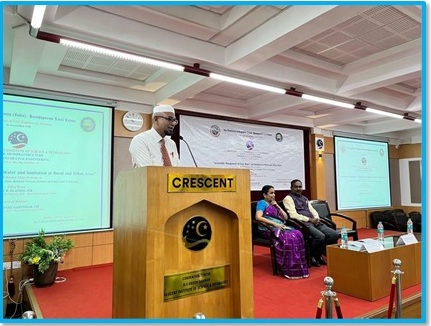
Figure VI (5.6) – 5: Presidential Address by Dr.M.S.Haji Sheik Mohammed, Professor & Dean (School of Infrastructure)

Figure VI (5.6) – 6: Chief Guest Introduction by Mr.Muhammad Ibrahim IV year, General Secretary, IE(I)
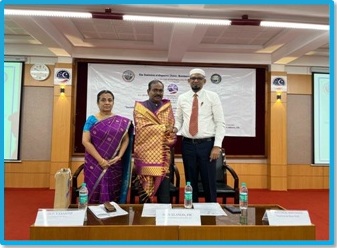
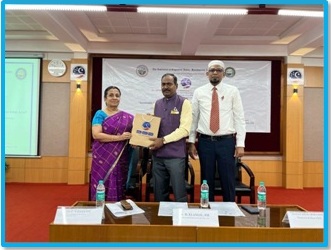
Figure VI (5.6) – 7: Honouring the Chief Guest by Dr.M.S.Haji Sheik Mohammed, Professor & Dean (School of Infrastructure) and Dr.Vasanthi Padmanabhan, Professor & Student advisor

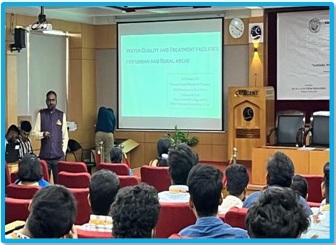
Figure VI (5.6)– 8: Inaugural Address and Keynote Lecture by Dr.D. Elango, FIE National Council Member & Chairman IE(I)-Kanchepuram Local Centre on the topic “Water Quality and Treatment facilities for Urban and Rural areas”
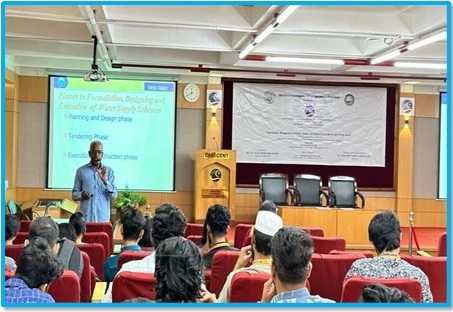
Figure VI (5.6) – 9: Guest lecture by Dr.T.Selvakumar Retd.Engineer (CMWSSB) and Research Consultant on the topic “Urban Water Supply & Sanitation in Rural & Urban Areas in India”
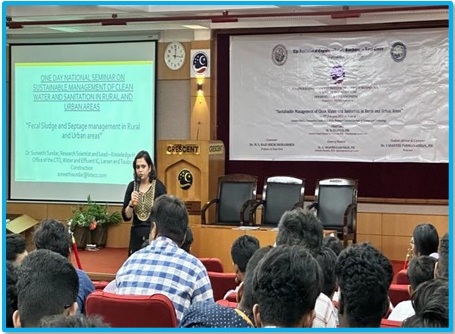
Figure VI (5.6) – 10: Guest lecture by Dr. Suneethi Sundar Research Scientist, Water & Effluent Treatment IC, L&T Construction on the topic “Faecal Sludge and Septage Management in Rural and Urban areas”
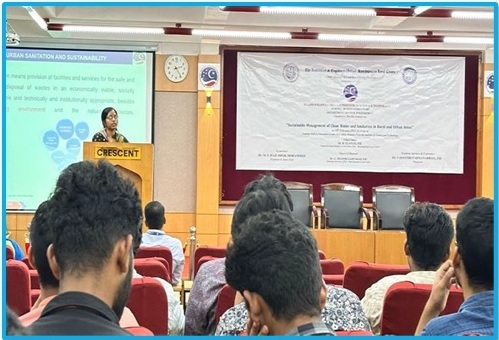
Figure VI (5.6) – 11: Guest Lecture by Dr.V.S.Priya Associate Professor, Civil Engineering, BSACIST, on the topic “Urban Sanitation in India: Opportunities and challenges”
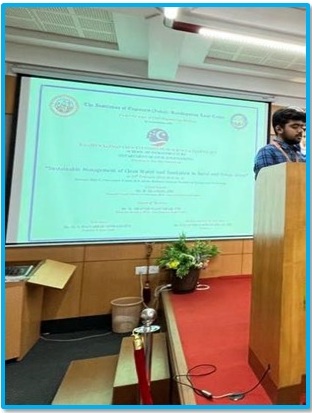
Figure VI (5.6) – 12: Vote of Thanks by Mr.Safeer Jasim(III Year) Joint Secretary IE(I)s
On May 11, 2023, an important discussion on “How to Make India Water Resilient” brought together distinguished speakers including Mridula Ramesh, CEO of Sundaram Textiles, Amith Chandra from Bain Capital, renowned water conservationist Rajendra Singh, and Ranganath NK from Grundfos Pumps India. This event underscored the pressing nature of the water crisis in India, a problem that continues to deepen without significant intervention. Ms. Ramesh shared findings from her research at the Sundaram Climate Institute, emphasizing the inequality that characterizes the water crisis and advocating for collective responsibility among individuals to foster water resilience in their communities.
1. FINDINGS FROM RESEARCH ON WATER CRISIS
Ms. Ramesh’s research drew from extensive field data, including conversations with thousands of individuals across various regions of the country. The study revealed alarming insights: the water crisis not only affects all of India but does so disproportionately, with urban areas facing different challenges compared to rural regions. One key takeaway is that everyone has a role to play; individuals must actively participate in local efforts to enhance water management. This notion of individual responsibility is critical if the collective goal of sustainable water management is to be achieved.
2. PERSPECTIVES FROM EXPERTS
Experts during the discussion offered valuable perspectives. For instance, raising awareness among urban populations emerged as a priority. Ms. Ramesh suggested implementing a system where urban dwellers must pay for water, thereby reflecting its true value and encouraging conservation practices. Conversely, Dr. Rajendra Singh pointed out that in rural Rajasthan, communities exhibit a strong commitment to water conservation. These communities have been known to build their own dams, demonstrating that with knowledge and motivation, rural populations can take water management into their own hands.
3. THE NEED FOR EDUCATIONAL INITIATIVES
Ravichandran Purushothaman added another layer to the conversation by stating that urban dwellers are generally less conscious of water conservation compared to their rural counterparts. This disparity emphasizes the need for targeted educational initiatives aimed at urban communities. To effectively combat the water crisis, it is crucial to develop educational programs that focus on the importance of conservation practices, utilizing the success stories from rural areas as models for urban populations.
4. CALL TO ACTION
In conclusion, the seminar reinforced the urgent need for a collective effort spearheaded by informed individuals to tackle the water crisis in India. By fostering education and awareness, especially among urban communities, there is hope for a more resilient future regarding water resources. This multi-faceted approach to water management emphasizes that a combination of individual responsibility and community engagement can pave the way toward sustainable solutions that address this pressing issue.
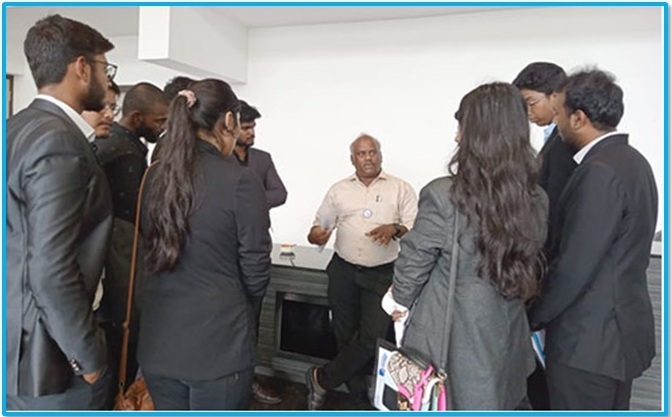
Figure VI (5.6) – 13: Interactive session on “How to make India Water Resilient?”
CAMPUS GUIDELINES AND OPERATIONAL PROTOCOLS
Enhance water-use efficiency comprehensively across various sectors and guarantee the sustainable extraction and provision of freshwater. B.S. Abdur Rahman Crescent Institute of Science and Technology has released guidelines and operational protocols aimed at minimizing water usage.
WATER AND WASTE MANAGEMENT
SAVE WATER
There is no life without water. Water is not only important for human beings but for the entire ecosystem. Hence prioritizing water management helps us to eliminate water waste and keep our water infrastructure operating in peak condition. Therefore, we kindly request our staff and students to close the water taps immediate after usage.
WASTE MANAGEMENT
Maintaining a clean environment is indeed a great place to live. If we keep our premises neat & clean in-turn our mind will be fresh and campus ambiance will be good, therefore we request our staff and students of our campus to drop the waste item in appropriate dustbins placed in the campus.
SIGNAGE BOARD(S)
Water is becoming a costly commodity and 80 % of the water requirements of this campus are met by the out sourced contract. As a result, we are promoting the conscious usage of water by all the stakeholders of the campus viz., students, scholars, faculty members, supporting staff and their families. In addition, awareness programmes such as World Water Day Celebration, Seminar on Water Usage etc., are being regularly organized.
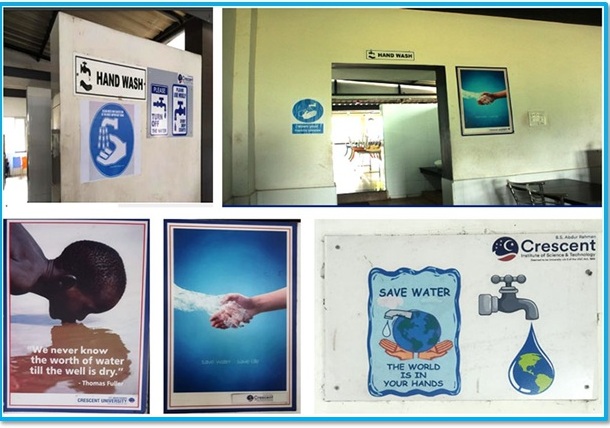
Figure VI (5.6) – 14 : Water conscious usage – Signage Boards at Crescent Canteen
Water Management and Reuse Policy
Issue: 04; Revised on 2023
| Policy Created on | July 2009 |
| 1st Revision amended on | IQAC Meeting held on 27th October 2017 |
| 2nd Revision amended on | IQAC Meeting held on 31st March 2021 |
| 3rd Revision amended on | IQAC Meeting held on 16th June 2023 |
6.1 STATEMENT OF POLICY
The B.S. Abdur Rahman Crescent Institute of Science and Technology is committed to achieving the following objectives in alignment with Sustainable Development Goal 6 (SDG 6) – Clean Water and Sanitation:
- a) Ensure universal and equitable access to safe and affordable drinking water for all stakeholders.
- b) Provide adequate and equitable sanitation and hygiene for all, with special attention to the needs of women, girls, and vulnerable groups.
- c) Improve water quality by reducing pollution, eliminating dumping, and minimizing the release of hazardous chemicals and materials.
- d) Halve the proportion of untreated wastewater and substantially increase recycling and safe reuse globally.
- e) Substantially increase water-use efficiency across all sectors and ensure sustainable withdrawals and freshwater supply to address water scarcity.
- f) Implement integrated water resources management at all levels, including transboundary cooperation as appropriate.
- g) Protect and restore water-related ecosystems, including mountains, forests, wetlands, rivers, aquifers, and lakes.
- h) Expand international cooperation and capacity-building support to developing countries in water- and sanitation-related activities and programs.
- i) Support and strengthen the participation of local communities in improving water and sanitation management.
6.2 REASON FOR THIS POLICY
The policy aims to provide all stakeholders with adequate water supply, sanitation, and hygiene. It emphasises maximising the collection and treatment of sewage generated and the reuse of treated wastewater sustainably, thereby reducing dependency on freshwater resources. The policy promotes treating wastewater as an economic resource.
6.3 RESPONSIBILITIES
6.3.1 Policy Principles
- a) The campus shall provide adequate water supply and maximize water reuse by adhering to the following principles:
- Equitable access to safe and affordable drinking water for all stakeholders.
- Access to adequate sanitation and hygiene, ending open defecation, with special attention to vulnerable groups.
- Calculation of water usage per person (students, staff, and faculty) annually.
- Improving water quality by reducing pollution and increasing recycling and safe reuse.
- Utilization of recycled/treated wastewater for beneficial purposes, such as irrigation and toilet flushing.
- Implementation of integrated water resources management at all levels.
- Protection and restoration of water-related ecosystems on campus.
- Expansion of rainwater harvesting initiatives.
- Collaboration with government, NGOs, and industries in water-related activities.
- Support for student and staff participation in water management.
6.4.1 Water Reuse Policy Objectives
- Establish a comprehensive policy to maximize water reuse across the university.
- Ensure that all new buildings adhere to water-conscious building standards that facilitate water reuse.
- Implement systems for tracking and measuring water consumption and reuse.
6.4.2 Water Reuse
- Water Reuse Policy: maximise water reuse across the university.
- Water Reuse Measurement: Measure water reuse across the university.
6.5 DISSEMINATION OF POLICY
- a) Display signage promoting water use efficiency across the campus.
- b) Conduct awareness programs at regular intervals to increase water-use efficiency.
- c) Post the policy on the Institute’s website and update it as necessary.
6.6 ENFORCEMENT OF POLICY
- a) The Director (Planning & Development) and Deputy Director monitor compliance and address breaches.
- b) Awareness of the policy among students, staff, and visitors is essential.
- c) Breaches may lead to disciplinary action as per the Institute’s code of conduct.
REGISTRAR


